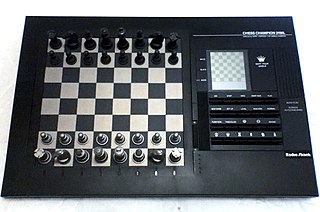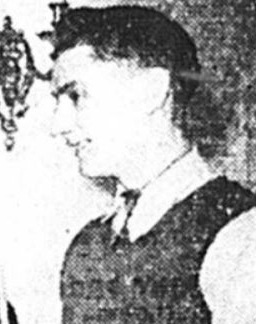Related Research Articles

Backgammon is a two-player board game played with counters and dice on tables boards. It is the most widespread Western member of the large family of tables games, whose ancestors date back nearly 5,000 years to the regions of Mesopotamia and Persia. The earliest record of backgammon itself dates to 17th-century England, being descended from the 16th-century game of Irish.

Björn Rune Borg is a Swedish former world No. 1 tennis player. Between 1974 and 1981, he became the first man in the Open Era to win 11 Grand Slam singles titles with six at the French Open and five consecutively at Wimbledon.

Computer chess includes both hardware and software capable of playing chess. Computer chess provides opportunities for players to practice even in the absence of human opponents, and also provides opportunities for analysis, entertainment and training. Computer chess applications that play at the level of a chess grandmaster or higher are available on hardware from supercomputers to smart phones. Standalone chess-playing machines are also available. Stockfish, Leela Chess Zero, GNU Chess, Fruit, and other free open source applications are available for various platforms.

Computer Go is the field of artificial intelligence (AI) dedicated to creating a computer program that plays the traditional board game Go. The field is sharply divided into two eras. Before 2015, the programs of the era were weak. The best efforts of the 1980s and 1990s produced only AIs that could be defeated by beginners, and AIs of the early 2000s were intermediate level at best. Professionals could defeat these programs even given handicaps of 10+ stones in favor of the AI. Many of the algorithms such as alpha-beta minimax that performed well as AIs for checkers and chess fell apart on Go's 19x19 board, as there were too many branching possibilities to consider. Creation of a human professional quality program with the techniques and hardware of the time was out of reach. Some AI researchers speculated that the problem was unsolvable without creation of human-like AI.

Jonathan Herbert Schaeffer is a Canadian researcher and professor at the University of Alberta and the former Canada Research Chair in Artificial Intelligence.
HiTech, also referred to as Hitech, is a chess machine built at Carnegie Mellon University under the direction of World Correspondence Chess Champion Hans J. Berliner. Members of the team working on HiTech included Berliner, Murray Campbell, Carl Ebeling, Gordon Goetsch, Andy Palay, and Larry Slomer. In 1988, it became the first computer system to beat a grandmaster.

David Neil Laurence Levy is an International Master of chess who plays for Scotland, and a businessman. He is noted for his involvement with computer chess and artificial intelligence, and as the founder of the Computer Olympiads and the Mind Sports Olympiads. He has written more than 40 books on chess and computers.

Raymond Reardon was a Welsh professional snooker player who dominated the sport in the 1970s, winning the World Snooker Championship six times and claiming more than a dozen other professional titles. Due to his dark widow's peak and prominent eye teeth, he was nicknamed "Dracula".

John Spencer was an English professional snooker player. One of the most dominant players of the 1970s, he won the World Snooker Championship three times, in 1969, 1971 and 1977. He worked as a snooker commentator for the BBC from 1978 to 1998, and served for 25 years on the board of the sport's governing body, the World Professional Billiards and Snooker Association (WPBSA), including a stint as chairman from 1990 until his retirement from the board in 1996.

Clifford Charles Devlin Thorburn is a Canadian retired professional snooker player. Nicknamed "The Grinder" because of his slow, determined style of play, he won the World Snooker Championship in 1980, defeating Alex Higgins 18–16 in the final. He is generally recognised as the sport's first world champion from outside the United Kingdom—since Australian Horace Lindrum's 1952 title is usually disregarded—and he remains the only world champion from the Americas. He was runner-up in two other world championships, losing 21–25 to John Spencer in the 1977 final and 6–18 to Steve Davis in the 1983 final. At the 1983 tournament, Thorburn became the first player to make a maximum break in a World Championship match, achieving the feat in his second-round encounter with Terry Griffiths.
Desmond Rex Williams is an English retired professional billiards and snooker player. He was the second player to make an official maximum break in snooker, achieving this in an exhibition match in December 1965. Williams won the World Professional Billiards Championship from Clark McConachy in 1968, the first time that the title had been contested since 1951. Williams retained the title in several challenge matches in the 1970s and, after losing it to Fred Davis in 1980, regained it from 1982 to 1983.

Clifford Wilson was a Welsh professional snooker player who reached the highest ranking of 16, in 1988-89. He was the 1978 World Amateur Champion and won the 1991 World Seniors Championship. He was a successful junior player, known for his fast attacking snooker and potting ability, and won the British Under-19 Championship in 1951 and 1952. In the early 1950s both Wilson and future six-times World Professional Champion Ray Reardon lived in Tredegar, where they played a succession of money matches that attracted large enthusiastic crowds.
Hans Jack Berliner was an American chess player, and was the World Correspondence Chess Champion, from 1965–1968. He was a Grandmaster of Correspondence Chess. Berliner was a Professor of Computer Science at Carnegie Mellon University. He directed the construction of the chess computer HiTech, and was also a published chess writer.

Paul David Magriel Jr. was an American professional backgammon player, poker player, and author based in Las Vegas, Nevada.
William Gerard (Bill) Robertie is a backgammon, chess, and poker player, author and teacher. He is one of several backgammon players to have won the World Backgammon Championship twice. Besides the World Championship wins in Monte Carlo, Robertie's major tournament victories include Boston, Las Vegas, the New York Metro Open, the Bahamas Pro-Am (1993), Istanbul (1994) and the Isle of Man Super-Jackpot (1984). In chess, Robertie won the 1970 U.S. Speed Chess Championship.
Chess was a pioneering chess program from the 1970s, written by Larry Atkin, David Slate and Keith Gorlen at Northwestern University. Chess ran on Control Data Corporation's line of supercomputers. Work on the program began in 1968 while the authors were graduate students at the university. The first competitive version was Chess 2.0 which gradually evolved to Chess 3.6 and was rewritten as the 4.x series. It dominated the first computer chess tournaments, such as the World Computer Chess Championship and ACM's North American Computer Chess Championship. At the ACM event, Chess won eight of the ten tournaments held from 1970 to 1979. NWU Chess adopted several innovative or neglected techniques including bitboard data structures, iterative deepening, transposition tables, and an early form of forward pruning later called futility pruning. The 4.x versions were the first programs to abandon selective search in favor of full-width fixed-depth searching.
This article documents the progress of significant human–computer chess matches.
Crazy Stone is a Go playing engine, developed by Rémi Coulom, a French computer scientist. It is one of the first computer Go programs to utilize a modern variant of the Monte Carlo tree search. It is part of the Computer Go effort. In January 2012 Crazy Stone was rated as 5 dan on KGS, in March 2014 as 6 dan.
In computer science, Monte Carlo tree search (MCTS) is a heuristic search algorithm for some kinds of decision processes, most notably those employed in software that plays board games. In that context MCTS is used to solve the game tree.
AlphaGo is a computer program that plays the board game Go. It was developed by the London-based DeepMind Technologies, an acquired subsidiary of Google. Subsequent versions of AlphaGo became increasingly powerful, including a version that competed under the name Master. After retiring from competitive play, AlphaGo Master was succeeded by an even more powerful version known as AlphaGo Zero, which was completely self-taught without learning from human games. AlphaGo Zero was then generalized into a program known as AlphaZero, which played additional games, including chess and shogi. AlphaZero has in turn been succeeded by a program known as MuZero which learns without being taught the rules.
References
- 1 2 Allen, Henry. "Gammonoid the Conqueror," The Washington Post. 17 July 1979, p. B1
- 1 2 3 Bray, Chris. "Man vs. Machine", The Independent (London). 11 December 2004, p. 75.
- ↑ Walsh, Toby (2018). Machines That Think : The Future of Artificial Intelligence. Amherst, New York. p. 40. ISBN 978-1-63388-375-8. OCLC 987428559.
{{cite book}}: CS1 maint: location missing publisher (link) - 1 2 Berliner, Hans, et al. "Backgammon program beats world champ", ACM SIGART Bulletin, Issue 69. January 1980. pp. 6–9.
- ↑ Berliner, Hans J. (1980). "Backgammon Computer Program Beats World Champion". bkgm.com. Archived from the original on 2021-03-30. Retrieved 2021-09-11.
- ↑ "Interactive replay of Villa's final against Philip Vischjager".
- ↑ Bray, Chris. "Monte Carlo 2006", The Independent (London). 29 July 2006, p. 61